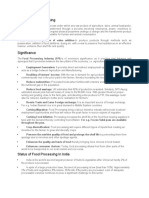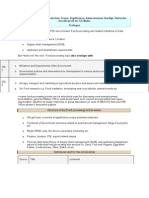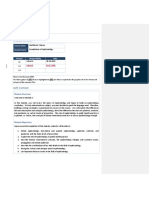MPPSC ABHYASSHALA – MP ECONOMY
MPPSC ABHYASSHALA
FOOD PROCESSING
Food Processing - The conversion of raw food material into food products and
keeping them edible for a long time is called food processing.
Food Processing includes process under which any raw product of agriculture,
dairy, animal husbandry, meat, poultry or fishing is transformed through a process
(involving employees, power, machines or money) in such a way that its original
physical properties undergo a change and the transformed product has commercial
value and is suitable for human and animal consumption.
For example, making chips from potatoes, making pickles from mangoes and
making cheese from milk, etc.
French scientist Nicolas Appert is called the father of food processing.
Louis Pasteur made the first commercial use of wine preservation from the
grape.
Indian Food Processing Research Center is located in Thanjavur (Tamil
Nadu).
The Ministry of Food Processing was first established in 1988.
In the year 1999, it was made under the Ministry of Agriculture, but in 2001
it was again given the status of an independent ministry.
Primary Processing –
Improves the quality of raw materials without changing the physical
appearance. Methods like cleaning, grading, cutting, sorting etc. are used in
this process.
For example, selling wheat in the market after harvesting.
Secondary Processing
Human labor, machine and capital convert the physical form to use of raw
materials through chemical processes.
JOIN OUR TELEGRAM CHANNEL FOR DAILY QUIZ – MPPSC ABHYAS SHALA - http://t.me/abhyasshala
�MPPSC ABHYASSHALA – MP ECONOMY
Like- Wheat flour making etc.
Tertiary Processing
Bringing agricultural or animal products to a ready-to-eat state.
For example, making biscuits and bread, noodles, etc. from flour.
Importance of food processing –
To increase the survivability of food items.
To eliminate harmful germs from milk, meat, sea foods and mix them with
other nutrients to make them edible.
To ensure additional benefit to the farmers.
To promote new economic activities.
To create new employment opportunities.
Ensuring food security.
Improving the nutritional status.
To boost export earnings.
Doubling of farmers’ income
Boosts Trade and Earns Foreign exchange: It is an important source of
foreign exchange. For e.g. Indian Basmati rice is in great demand in Middle
Eastern countries
Curbing Migration: Food Processing being a labour intensive industry will
provide localized employment opportunities
Crop-diversification: Food processing will require different types of inputs
thus creating an incentive for the farmer to grow and diversify crops
Food processing industry can be segmented as follows -
Cereal/ pulse milling
Fruit & vegetable processing
Milk & milk products
Beverages like coffee, tea & cocoa
JOIN OUR TELEGRAM CHANNEL FOR DAILY QUIZ – MPPSC ABHYAS SHALA - http://t.me/abhyasshala
�MPPSC ABHYASSHALA – MP ECONOMY
Fish, poultry, eggs & products
Meat & meat products
Aerated waters/soft drinks 8. Beer/alcoholic beverages
Bread, biscuits & other bakery products
Edible oil/fats.
Confectioneries
Breakfast cereals, malt protein, weaning, extruded food products
Upstream and Downstream Requirements -
The words upstream and downstream are used in small scale industries and food
processing industries.
Upstream requirements- these are the requirements before or immediately after
the establishment of the industry, these include all those requirements which are
necessary before the final product such as raw material, finance, credit,
transport, electricity and water, communication, research, labor, Modern
technology etc.
Downstream Requirements - The needs from the end product to the end
consumer are called forward needs. Such as - cold storage, advertising,
distribution, transportation, consumer and purchasing power, seller,
distributor, management and marketing, packaging.
Problems in Food Processing Industries
At present most of the industries are in unorganized sectors. So, number of
problems are arising from different sections of the industries. Some of the basic
problems encountered by Indian food industries at different levels are given below.
Farm level problems
Poor yield of farm produce and therefore low returns.
Lack of material resources necessary for development.
Primitive methods of farming.
No control on the quality of inputs and lack of finance to manage.
JOIN OUR TELEGRAM CHANNEL FOR DAILY QUIZ – MPPSC ABHYAS SHALA - http://t.me/abhyasshala
�MPPSC ABHYASSHALA – MP ECONOMY
Vagaries of weather.
Unavailability of reliable handling and transportation system.
Lack of storage facilities at farm.
Distributors’ problems -
Lack of modern transportation facilities and high cost
Inadequate cold storage faculties
Irregular quality and quantity of farm produce
Processing industries problem -
Financing
Higher import duties
Higher cost of raw material and packaging
Inadequate transport and cold storage facilities
Infrequent availability of refrigerated containers
Staggering advertising costs.
Consumer discontent
Does not get value for money
The price variation is a day to day affair
Continued dependence on seasonal products
Lack of variety of semi processed or prepared convenience food at affordable
prices.
Reasons for slow growth of processed foods in India
Majority of the population has low-income levels and cannot afford
processed foods.
The high cost of packaging pushes up the cost of the processed items and
thereby makes them out of reach of the common man.
Indians traditionally prefer fresh foods that are cooked rather than use
preserved foods.
There is also no national character for food habits and these keep changing
from region to region.
JOIN OUR TELEGRAM CHANNEL FOR DAILY QUIZ – MPPSC ABHYAS SHALA - http://t.me/abhyasshala
�MPPSC ABHYASSHALA – MP ECONOMY
However, the scenario is changing with some foods, especially fast food,
acquiring the national character. Also some foods such as idli, dosa, some
Punjabi foods like chhole, alu mutter etc.,
some Chinese foods and now the western foods like burgers and pizza are
fast gaining national popularity.
Transport (both road and railways) and communication are poor.
There are no reliable cold chains, which are necessary for temperature
sensitive foods like fruits & vegetables, ice creams etc.
Modernization is unaffordable for small-scale manufacturer but the large
companies do not find investment justifiable due to small size of the market.
Supermarkets are not yet popular although a few are making an appearance.
Suggestions -
Storage capacities and infrastructure should be increased.
Develop the agricultural facility with good agricultural practice which
leads to the transition from staple food crops to diversification of crops.
Backward linkages to farmers need to be made more robust.
Contract farming can be promoted.
Skilling is required at two levels. First at the farm gate in promoting
agricultural best practices and in processing activities.
Public investment and connectivity should be increased.
Slaughter animal rules should be framed in a comprehensive policy
framework.
Farm pattern diversification which leads to a production of variety of
crops other than constant set of crops which creates lot of job opportunities.
Second Green Revolution should be updated with the diversified
technologies.
We have to encourage the domestic startups and industry than the
international companies.
There should be a Centre of Excellence between centre and state.
Should have more training institutes for upcoming entrepreneurs and it
should be in all states. Scholarship should be given to the upcoming
entrepreneurs.
JOIN OUR TELEGRAM CHANNEL FOR DAILY QUIZ – MPPSC ABHYAS SHALA - http://t.me/abhyasshala
�MPPSC ABHYASSHALA – MP ECONOMY
New technology should be updated in the training institutes and skill
development should be given the top most priority.
Food Processing in Madhya Pradesh –
Horticulture and Food Processing Department was established on 22
December 2005 by separating it from Agriculture Department in Madhya
Pradesh.
Presently Shri Bharat Singh Kushwaha is the Minister (Independent Charge)
of Food Processing Department.
Presently Shri Manoj Agarwal is the Director of Food Processing
Department.
At present there are 11 food parks including two mega food parks which
have been set up at Khargone, Dewas, Babai, Hoshangabad, Malanpur,
Neemrani, Ratlam, Maneri, Barodi (Shivpuri), Borgaon (Chhindwara) and
Jaggakhedi (Madsaur).
ORGANISATIONS-
Food and Agriculture Organization of the United Nations
1945, HQ – Rome, Italy.
a specialized agency of the United Nations that leads international efforts to
defeat hunger and improve nutrition and food security.
Food Safety and Standards Authority of India (FSSAI)
a statutory body established under the Ministry of Health & Family Welfare.
FSSAI ACT- 2006.
Set up in 2008 for the proper monitoring of food hygiene and quality in
India. It was functional from 2011 and ever since has been responsible for
managing food safety in our country.
JOIN OUR TELEGRAM CHANNEL FOR DAILY QUIZ – MPPSC ABHYAS SHALA - http://t.me/abhyasshala
�MPPSC ABHYASSHALA – MP ECONOMY
The Codex Alimentarius Commission
CAC ( 1963 ) is the body responsible for all matters regarding the
implementation of the Joint FAO/WHO Food Standards Programme.
Schemes / efforts related to food processing
Mega Food Park –
It has been started since 2008 to promote food processing.
Under this scheme, 42 mega food parks have been approved in India, but the
number of mega food parks operating at present is 22.
United Buy Food Campaign –
On the occasion of India's 74th Independence Day, the Ministry of Food
Processing Industries launched a monthly awareness campaign called United Buy
Food on social media. In this, famous cuisines and processed foods of different
parts of the country and union territories were told.
Processed Yane Paushtik Campaign –
In September 2020, the Ministry of Food Processing in association with the
Ministry of Women and Child Welfare launched a campaign named 'Processed'.
Operation Green Scheme
Under this scheme, transportation and storage of 41 (21 fruits and 20 vegetables)
horticultural crops is provided.
Aspire Scheme
It has been started by the Ministry of Micro, Small and Medium in 2015.
ASPIRE was launched to set up a network of technology centres and to set up
incubation centres to accelerate entrepreneurship and also to promote start-ups for
innovation and entrepreneurship in agro- industry.
JOIN OUR TELEGRAM CHANNEL FOR DAILY QUIZ – MPPSC ABHYAS SHALA - http://t.me/abhyasshala
�MPPSC ABHYASSHALA – MP ECONOMY
PMKSY – (2017)
(Pradhan Mantri Kisan SAMPADA Yojana)
The Ministry of Food Processing Industries (MoFPI) is implementing.
The objective of PMKSY is to supplement agriculture, modernize processing and
decrease agri-waste.
It is an umbrella scheme incorporating ongoing schemes
Under PMKSY the following schemes are to be implemented.
Mega Food Parks.
Integrated Cold Chain, Value Addition and Preservation Infrastructure.
Creation/Expansion of Food Processing/Preservation Capacities.
Infrastructure for Agro Processing Clusters.
Scheme for Creation of Backward and Forward Linkages.
Food Safety & Quality Assurance Infrastructure.
Human Resources and Institutions.
Foreign Direct Investment (FDI) policy: FDI up to 100%, under the automatic
route is allowed in food processing industries.
Agricultural and Processed Food Products Export Development Authority
(APEDA)–
Established – 1986.
An apex organization under the Ministry of Commerce and Industry – focusses on
‘export’ of scheduled products.
JOIN OUR TELEGRAM CHANNEL FOR DAILY QUIZ – MPPSC ABHYAS SHALA - http://t.me/abhyasshala























































































